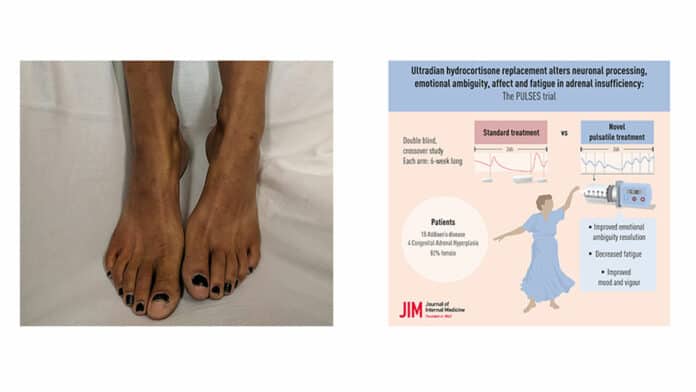Known causes of low levels of the vital hormone “cortisol” include Addison’s disease and congenital adrenal hyperplasia. The hormone controls several critical functions, including blood pressure and blood sugar levels, and cognitive functions like memory formation, metabolism, and immunological responses.
It can cause dangerously low blood pressure, sadness, nausea, and feelings of muscle weakness when it is quiet. These adrenal disorders, however uncommon, necessitate regular hydrocortisone replacement medication for the rest of your life.
Although current oral hormone replacement therapy can raise cortisol levels, individuals still report a lower quality of life. According to scientists, The reason for this is that the current therapy does not replicate the body’s typical physiological timing, missing both the anticipatory spike in cortisol and its underlying ultradian and circadian cycles.
A pulsatile subcutaneous pump can closely replicate cortisol’s circadian and ultradian rhythm. A new study by the University of Bristol assessed the effect of pump therapy on quality of life, mood, functional neuroimaging, behavioral/cognitive responses, sleep, and metabolism.
This ‘Pulsatility’ has been designed to offer standard hydrocortisone replacement to patients via a pump that replicates cortisol’s natural rhythmic secretion pattern more closely.
Results from the clinical trial show that this first-of-its-kind hormone replacement therapy improves symptoms in patients with adrenal conditions. It more closely replicates the natural circadian and ultradian rhythms of our hormones.
During the double-blinded PULSES six-week experiment, twenty volunteers with adrenal insufficiency problems, aged 18 to 64, were evaluated and treated with standard dose hydrocortisone replacement medication, which was given either via the pump or the usual three times daily oral treatment.
The pump therapy enhanced patient energy levels by 30%: the first thing in the morning, a crucial period when many patients struggle, lowered fatigue by around 10%, and improved mood. However, only psychological and metabolic symptoms were evaluated during the experiment. MRI scans of the patients also showed changes in the brain’s processing of emotional data.
Dr Georgina Russell, Honorary Lecturer at the University’s Bristol Medical School and the lead author explained: “Patients on cortisol replacement therapy often have side effects that make it difficult to lead normal lives. We hope this new therapy will offer greater hope for the thousands of people with hormone insufficiency conditions.”
Stafford Lightman, a neuroendocrinology expert and Professor of Medicine at Bristol Medical School: Translational Health Sciences (THS) and the study’s joint lead author, added: “Besides reduction in dosage, cortisol replacement has remained unchanged for many decades. It is widely recognized that replacement therapy is unphysiological due to its lack of pre-awakening surge, ultradian rhythmicity, and post-dose supraphysiological peaks. The new therapy clearly shows that the timing of cortisol delivery- in line with the body’s rhythmic pattern of cortisol secretion – is important for normal cognition and behavior.”
“Our findings support the administration of hormone therapy that mimics natural physiology and is one of the first major advances in adrenal insufficiency treatment to date.”
Joe Miles, a participant in the PULSES trial, explained: “The Crono P pump has been life-changing. I noticed a rapid improvement compared to tablets when I was on the PULSES study. I went from feeling tired all the time to having sudden energy.”
“When the PULSES study ended, and I had to return the pump, I simply couldn’t cope with going back to how I used to be, so I made it my mission to write to as many doctors to have it prescribed privately.”
Journal Reference:
- Georgina Russell, Konstantinos Kalafatakis, Claire Durant et al. Ultradian hydrocortisone replacement alters neuronal processing, emotional ambiguity, affect and fatigue in adrenal insufficiency: The PULSES trial. Journal of Internal Medicine. DOI: 10.1111/joim.13721
